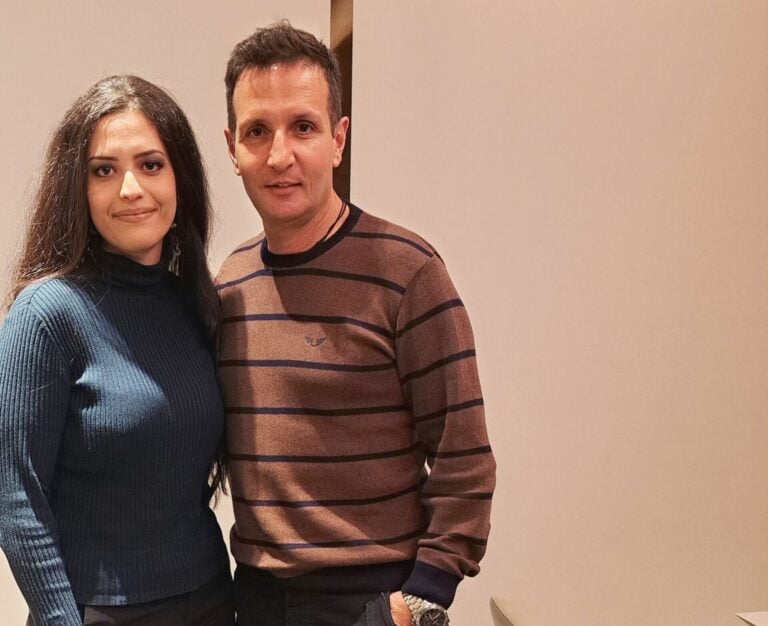Dimitris Basis, a major figure in Greek music, is in Australia to present The Dead Brother’s Song, by the legendary composer, Mikis Theodorakis. In a candid one-on-one with Neos Kosmos Dimitris Basis shared his thoughts and feelings about this year’s tour in Australia, his collaborations with Mikis Theodorakis, but also about his future plans.
In the Australian tour, you will perform The Dead Brother’s Song by Mikis Theodorakis. Share if you talk about your connection with Theodorakis, like how you felt when you first met him?
I had an intense collaboration with Mikis Theodorakis. I knew him and was in awe of him. I never overcame this feeling. As time passed, we became close friends, and I would visit him at his home. In recent years, before I would go on a tour abroad, I discussed the tour with him. I feel blessed to have met this great Greek and to share the experience, with future generations. I had the honour of doing two albums with him. One of them, The Dead Brother’s Song, I had the fortune of being only the second person to perform it. The first performance was in 1962 by Grigoris Bithikotsis. Some of the songs were censored and were, at the time, banned from being included in the album. Now that the album is complete, it has been released and was curated in the studio by Mikis and his orchestra. It was a great honour to be the second performer of the piece, and for the first time, The Dead Brother’s Song will be played by a symphonic orchestra.
Is there an interesting story regarding Theodorakis that you particularly remember ?
It always impressed me how simple Mikis was, how very approachable. He had a way of making one feel relaxed. The first time I was with him in the studio, I stressed, but he had a way of taking all the stress away, and helping me sing to the best of my ability.
How do you feel that the pandemic seems to be over, and you can perform for an audience?
It’s a nice feeling to be back to normal after what we went through. The only concert that did not take place last year was the one in Melbourne and it was a concert that I wish had taken place. Things are different this year. I want to believe that we have left the pandemic behind us and we will be able to function as before. The feeling of coming to Australia is very beautiful. I like it here. I like the hospitality of the people. The Greeks of Australia are organized and united around communities and churches. Coming to the other side of the planet and finding Greeks who for generations keep their customs is something that impresses me. A small part of our homeland is here.
Recently, you sang some songs for the Greek television series Sasmos. Do you have any new plans?
For Sasmos, which is a very successful TV series in Greece, some songs were written and they were composed by Nikos Terzis and the lyrics were written by my friend Giannis Kotsiras. I have sung two songs and, in the second season, I will sing one more which will be a duet with Giannis. I don’t have other recording plans at the moment. In summer, I will go on tour of Greece and in October, America.

Are things a little better now in Greece?
Last year things were bad, but this year there is some normality. Full capacity is allowed, something very important in our profession. This also allows people to feel free, as they can now be in crowded spaces.
Besides the tour focusing on Mikis Theodorakis’ The Dead Brother’s Song, I think you are also preparing another event in Melbourne at the end of the month focusing on the Hellenism of Asia Minor?
Yes, we will perform some traditional songs from Smyrna since this year is the 100th anniversary of the burning of Smyrna. I like songs from Smyrna, since my grandfather was from Constantinople, but also traditional songs in general, since I am from Kilkis. I am quite touched by oriental melodies.
As far as I know, your love for Byzantine music began when you heard a chanter in the village church at the time.
When I little, my grandmother used to send me to church and there I discovered the magic of Byzantine music. We had a good cantor and soon I went up to the psalter with him. He introduced me to Byzantine music and later did my studies on it.
When I finished my studies, I sung at various events and after an audition that took place in Kilkis, I entered singing professionally. Luck was very generous with me. I am happy for all that I have achieved and I still have a lot to give, as music is a marathon, not a sprint. You go as far as your strength can hold.
What is your message for the Greeks of Australia and for the people who will attend your concerts?
They will witness an important performance on the Civil War in Greece, composed by Mikis and one of his favourites. It is an astounding project. I am glad that it was decided by the communities here to present this work by Mikis, and, in fact, written for a symphonic orchestra for the first time.
My message, especially to the younger people, is to take the legacy from the older ones, to keep the Greekness here. As for the older ones, I urge them to give way to the younger ones and hand over the baton to them. The natural evolution of life. If we want our children to feel Greek, we must teach them to love Greece, to teach them our manners, customs and history, our language and to encourage them to engage with the communities.